Murder on the Orient Express is one of the most famous murder mysteries written by Agatha Christie. As such, it is also among the most adapted ones. It is, perhaps, not the best choice of all of her work. Her strength, beside flawlessly plotted mysteries, has always been characters. She has the rare talent of making the character seem so alive in a few sentences that you can see them standing before you. That is not easy to match in an adaptation where you have limited space, and all she can say outright must be expressed by acting. It becomes extremely difficult in Murder on the Orient Express, which contains about twice as many crucial characters as most of Christie’s other books, and for reasons inherent to the plot it is difficult to curb that number.
Nevertheless, filmmakers do keep trying, and the most recent attempt is barely two weeks old. In light of that, allow me to present a little guide to these adaptations, meant both for connoisseurs of Christie’s work and the films and for those who would like to try one version but are not sure which. Because of this, I avoid spoilers. I can’t quite prevent some little hints dropping in the course of this article that might spoil your viewing pleasure a little if you haven’t seen the films or read the books, though. For that I apologize in advance.
For those unfamiliar with the story but interested, here is a listing of characters to help you through, since as I said, they are the backbone of the story.
- Poirot – the brilliant detective. Come on, everyone knows that one, right?
- Ratchett – the murdered man
- MacQueen – Ratchett’s secretary
- Masterman – Ratchett’s valet
- Michel – the train conductor in the relevant carriage
- Count and Countess Andrenyi – a Hungarian diplomatic couple
- Princess Dragomiroff – a Russian expat cosmopolitan
- Fraulein Schmidt – her maid
- Greta Ohlsson – a Swedish missionary, “rather like a sheep”
- Mary Debenham – a very collected English governess
- Mrs. Hubbard – a very not-collected American widow
- Colonel Arbuthnot – the quintessential British colonel serving in India
- Foscarelli – an Italian cars salesman
- Hardman – an American salesman/detective
And with that out of the way, let’s get straight down to that list.
5. Murder on the Orient Express (2001)
The biggest issue with this adaptation, I’m afraid, is production value and—related to that—the acting abilities of most actors. The need to save money is visible in effectively every aspect of the film, to the point that it actually detracts from watching. If it had something else to compensate for it, one might be able to forget it, but unfortunately, there is nothing. Bland actors (who all look the same) recite bland lines in a bland setting. Some of the actors at least are not bad in themselves, though, so perhaps that point rather underlines how bad everything else about this adaptation is. It’s just a whole lot of nothing to catch your attention or interest.
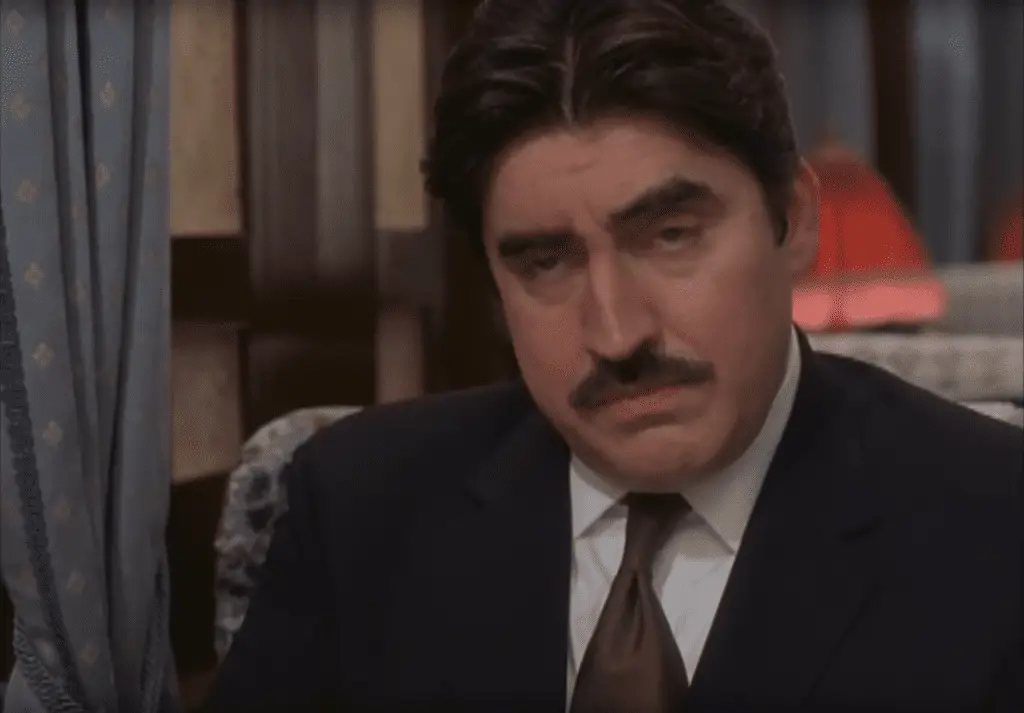
In the interest of fairness, this adaptation tried to get around the problem of too many characters by focusing on just a few. Namely Arbuthnot, Dragomiroff, Foscarelli, Mary Debenham and Mrs. Hubbard. They even cut a few of the rest. It’s a controversial decision in that it influences the reasoning behind the crime rather significantly and changes the atmosphere of many people from different paths of life being brought together.
But, if done for a legitimate reason, it could actually be a very good choice. If it meant those five were given real character focus and depth, it would actually be a sacrifice that could be worth it. Unfortunately, it did not lead to anything of the sort. Once more I sense the need to minimize production cost as the chief motivation. The characters remained bland and shallow, there was just a bit less of them, which is, perhaps, a blessing.
This film, probably also for reasons of saving money, is a modern alternate universe (AU). That has some practical problems—Poirot having internet access would turn this investigation into a much simpler matter. Some adaptational choices made in transforming this into a modern AU bear mentioning, though. Princess Dragomiroff becomes the widow of a South American dictator and Colonel Arbuthnot, an IT giant. The first is relatively fitting, the second much less so. Some other details were changed as well, like using a stylus instead of a pipe cleaner.
To give a bit more particular attention to the characters, since, as I said, the adaptations stand and fall with them, there were a few significant changes made with the reduction of characters. Dragomiroff became more like book Mrs. Hubbard in character and thus closer to a caricature, but at least she wasn’t as bland as most actors here. The women were generally better, in fact. Mary Debenham actually made one of the best, if not the best, showing of all the adaptations here, and even Mrs. Hubbard wasn’t wholly bad, though much less carefully crafted than in the book. The men, though…the less said about them, the better. Arbuthnot especially was almost painful.
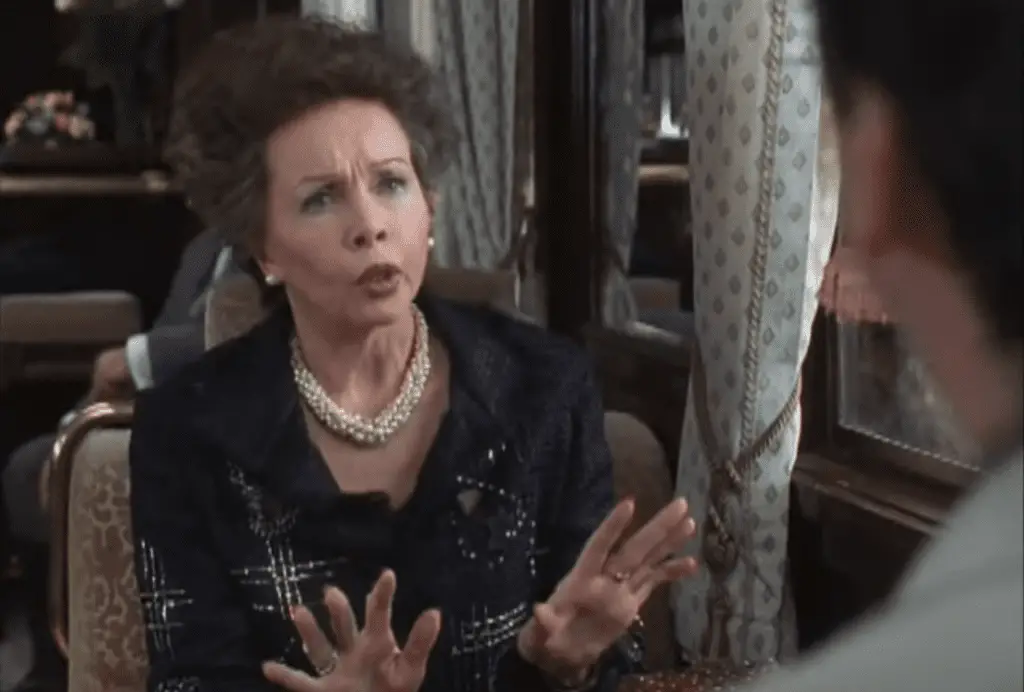
There were also changes made to the plotting of the mystery itself that made it fall apart. We will see that is a frequent problem. One would think that while coming up with a consistent murder mystery is hard, making sure you don’t change one of the crucial plot pieces after someone else came up with it would not be so difficult. Apparently, not.
In short, this film is a whole bag of nothing with no tension that makes you feel nothing, though there are a few (well, two) acting performances that make it at least not wholly terrible. The second film on this list, on the other hand, has very different issues.
4. “Murder on the Orient Express” (2010, part of the Agatha Christie’s Poirot TV Show)
It’s actually extremely difficult to compare this adaptation with the previous one. While the 2001 one film makes me feel nothing at all, this one makes me feel a whole lot of things, and none of them are good.
I’ll be up front. I have a beef with this film. A huge one. There are no words for how much I hate a specific scene towards the beginning of the film. It’s a scene of a stoning in the streets of Istanbul. It’s one of the more glaring cases of Orientalism and racism I’ve come across in TV less than 20 years old.
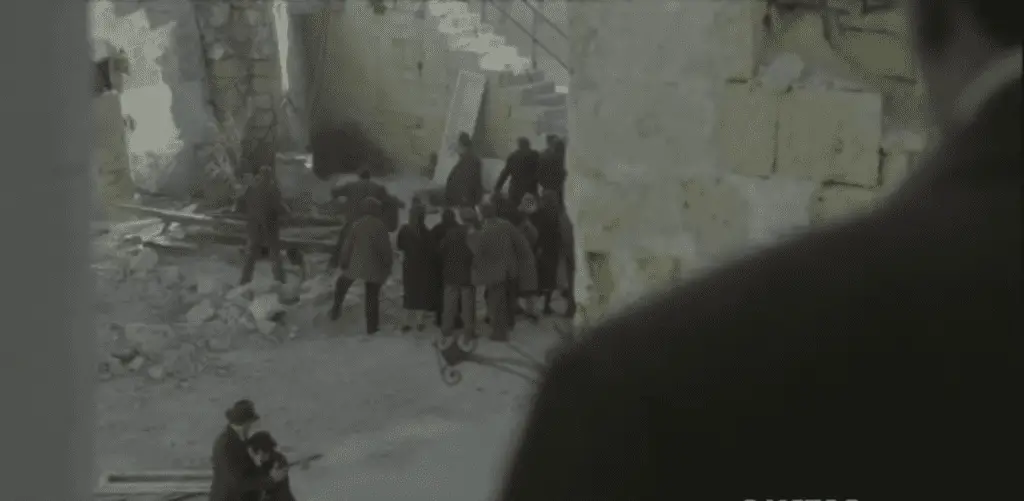
In case anyone is unsure, let me point out two things. A) random stonings in the street by a mob is not how the hadd punishment for adultery works, and b) Turkey in the 30s was a far more secular state where even a lot of religious symbols were banned in public. Criminal law had no basis in religious law. Not that what we saw in the film had anything to do with religious law, just so I’m clear. Such things haven’t happened in Istanbul with approval from high places probably since the Crusaders attacked it when it was still Constantinople. In short, this is not how sharia works. It was pure racist bullshit and it can fuck right off along with the people who thought writing that scene was a good idea.
That being said, I will do my best to move on from that in my evaluation of the film.
You can tell that they were trying to do something different with this adaptation, to make it distinct from all the other ones. The idea of how to go about it wasn’t even all bad. Unfortunately, the result was mostly a big mess.
This is perhaps a case where it’s most important to make the distinction between the quality of an adaptation and the quality of a film as such. As a film, I suppose this is not so bad. It’s a film about Poirot, clearly, about his personal choices and view of justice; all other characters are there mostly as background and to act as a foil to him.
As an adaptation, it’s a disaster.
Chiefly, of course, because the book is not about Poirot at all. His personality always shines through, naturally, because Christie knows how to write. But it’s the supporting cast that inevitably forms the true bones of the story. Here, they were pushed completely into the background, and with them most of the story’s attraction. No character had enough space to truly shine.
The only one where I can offer praise is Michel, who was probably the best done here out of all the adaptations. Ratchett seemed to be done very well, until his talk of penance and his prayer was included, at which point it all went to hell, because the themes of the book were lost with it. Adaptational efficiency showed in exchanging one of the passengers for a doctor. It was a good idea, too, even though it did require Poirot to gain more medical knowledge than he normally possesses. But that’s about it for good adaptational choices.
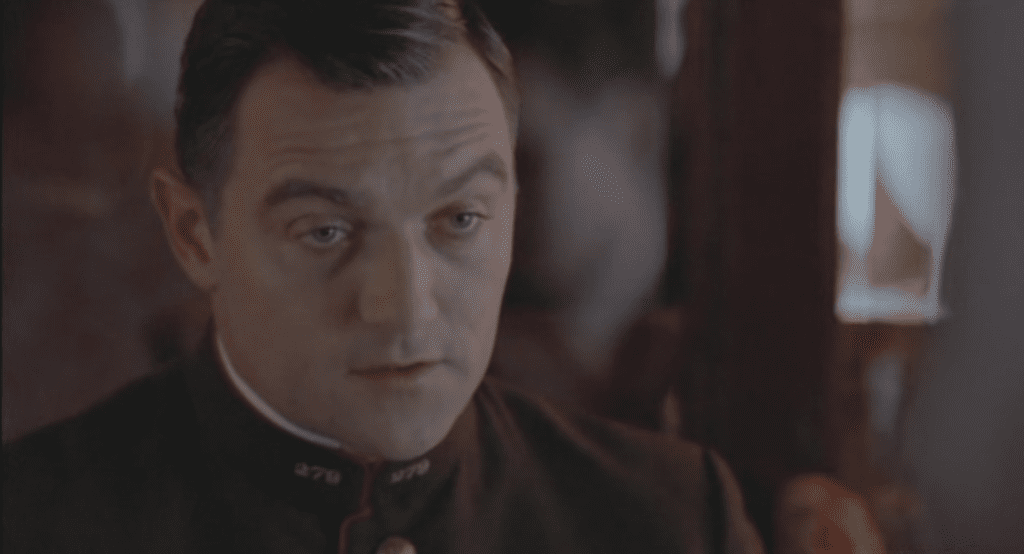
All the other characters were either uninteresting shadows of themselves or completely missed the mark. The second is certainly true for Miss Debenham, who has absolutely nothing in common with the cool, collected English governess we meet in the book. Masterman had nothing of the unruffled calm of a trained valet either, and Mrs. Hubbard lost the entirety of the charm of her character. Princess Dragomiroff, too, for how much space she got, worked surprisingly badly. Greta Ohlsson was different but not entirely bad, I suppose, if one manages to ignore the theological nonsense she is spouting.
There were also a few random changes to the details of the case that, much like with the 2017 film, made it stop making sense. It’s equally a mystery to me this time as it is with the most recent adaptation. Another problem was that the time was very limited—and there were added scenes to boot—so very little space was left not only for characters, but even for the investigation. Poirot seemed like a wizard towards the end as he was pulling answers out of his ass.
So, to reiterate, as an adaptation it was a mess. Coming back to evaluating it as a film on its own…there are still major issues. Or rather, one issue.
When you decide to focus entirely on one character’s development in your film, you should take care to avoid making that character into a one-dimensional caricature, because then it will hardly be compelling. Unfortunately, it’s what happens here with Poirot.
His position at the beginning looks like an inexperienced Dungeons and Dragons player being a lawful neutral character for the first time. It has no nuance, no substance, nothing. Law is the law and it must be upheld. Poirot repeats this even in cases when it makes no sense, like when he manages to provoke someone into a suicide by his completely overblown bout of rage. He then tries to justify his behavior by talking about the law. The film tries to somehow connect this to lofty philosophical questions of justice, even though it’s clearly an issue of Poirot’s personal mental problems instead. Someone that out of control should’t be allowed to work with people.
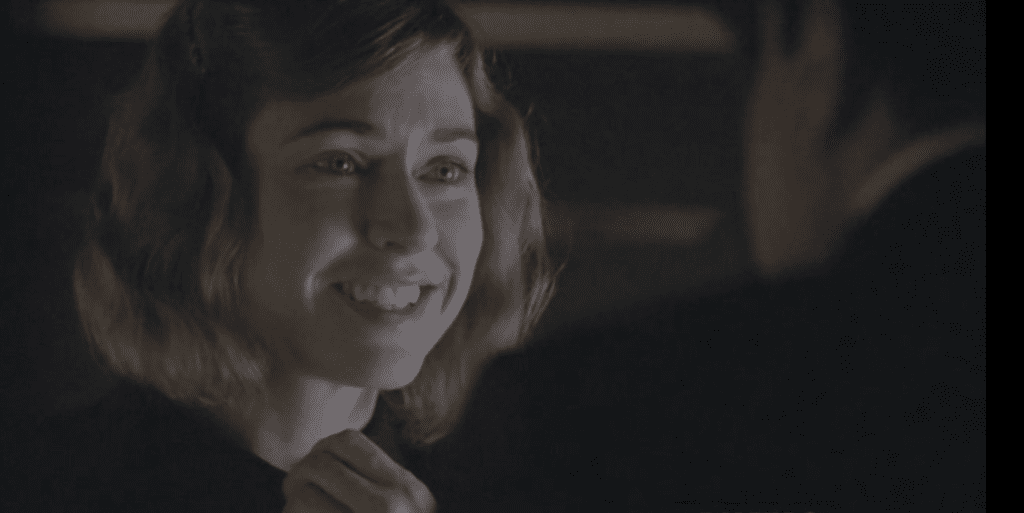
Oh, and also the philosophy is painfully bad. So is the theology, as I’ve mentioned. The film insists on talking about Jesus and God all the time for some reason, and depicting prayers, but the depiction is about as accurate as their understanding of sharia at the beginning.
I tried hard to find something good about this film. Truly, I did. I can say that…the final scene was nice? Very nice, actually. It’s a pity that to have emotional strength, it would need to grow out of more solid ground.
3. Murder on the Orient Express (2017)
This film is…fine. Probably. If it wasn’t an adaptation, I think I’d be coming away from it feeling a whole lot of nothing, because the only truly good part of it was the plotting, which, of course, was done by Agatha Christie.
As an adaptation, it was moderately bad.
There was hardly a character they adapted well, but they were not adapted disastrously badly. Perhaps Game of Thrones has given me a new bar to measure things against? Poirot probably fared the best. He’s fairly authentic, but even he didn’t escape from puzzling changes. The most astonishing one, to me, was giving him a picture of a beloved woman he sighs over at night. All right, but…why?
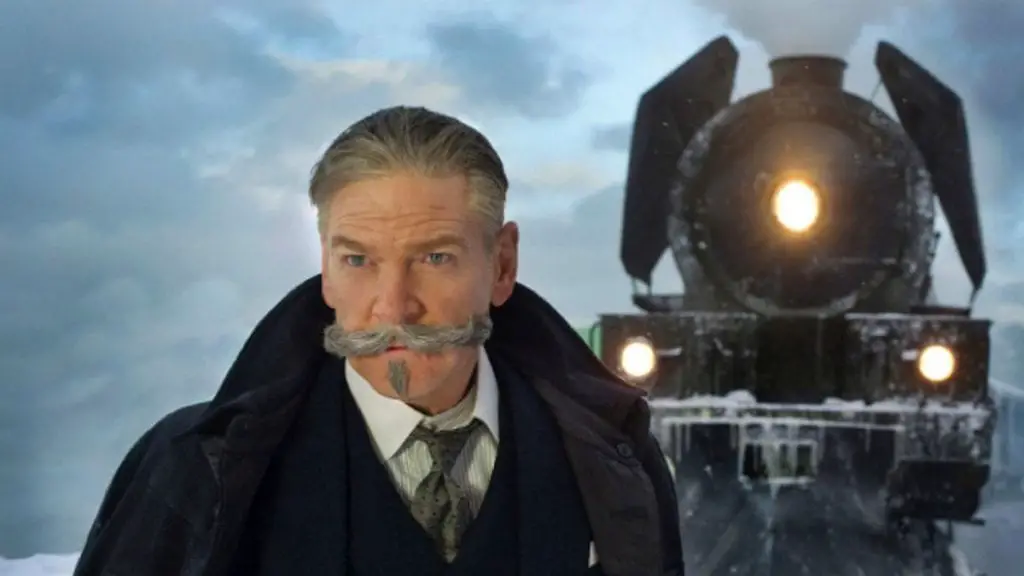
The same confused why applies, once again, to changes in the logistics of the crime itself and some of its circumstances. In fact, it was full of mystifying changes. I suppose I can understand the need to add action sequences. There seems to be the feeling that no film for the big screen can be truly successful without them. I’m expecting a French invasion in the next Austen adaptation. Here we got an avalanche, a derailed train almost falling off a bridge (and had it followed the laws of physics, it totally would have fallen), wrestling, and a mad scramble down the bridge’s scaffold. All of it was pretty much pointless and took time that could have been spent on something more crucial, like character building.
Nothing, however, tops the random decision to have a character pretend he is an Austrian racist, thus giving him a chance to spew racist insults throughout the film. Did…did they read Christie’s book and think “this needs more racism”? Actually, that seems to be a common reaction, given the stoning scene in the 2010 adaptation. Interesting, because if there’s something I never felt Chrstie’s books lacked, it was racism. But it’s true that Murder on the Orient Express might actually be below average for her, surprisingly, so perhaps the poor filmmakers are just trying to bring it up to par?
Anyway, speaking of racism. Colonel Arbuthnot is played by a black man here, which would be awesome, if the changes to his character also didn’t transform him from a polished, stiff and pompous English Colonel into a doctor who wrestles with Poirot and shoots him. Not the most fortunate choice.
The highlight of this film was the attempt to treat Poirot’s obsessive-compulsive tendencies as a serious mental disorder instead of a funny quirk. The same goes for Countess Andrenyi’s PTSD. Even that, though, the film managed to spoil towards the end. We hear Poirot say that he’ll just have to deal with the fact that everything is not the way it should be for once, as if he got over his disorder so nicely. Likewise, the Countess is seen pouring the medicine for her nerves down the drain. As we all know, naturally, murder is just the thing to cure your mental health issues.
Now to the rest of the characters, since I keep insisting they are the most important part. McQueen was decent and had his own charm, though he was also different from the book, and his character, as it was written, made little sense. The rest mostly didn’t get enough space to become interesting. Michel and Foscarelli (who became Marquez in this version) were decent, that’s the most I can say about them. Judi Dench as Princess Dragomiroff had great potential, I’m sure, but unfortunately all of her amazing scenes from the book were cut, so what we got was a whole lot of nothing. Oh, and the Andrenyis were a complete disaster. The Count, apart from being randomly violent, is also apparently a dancer now. Again, a very confused “why?” from me.
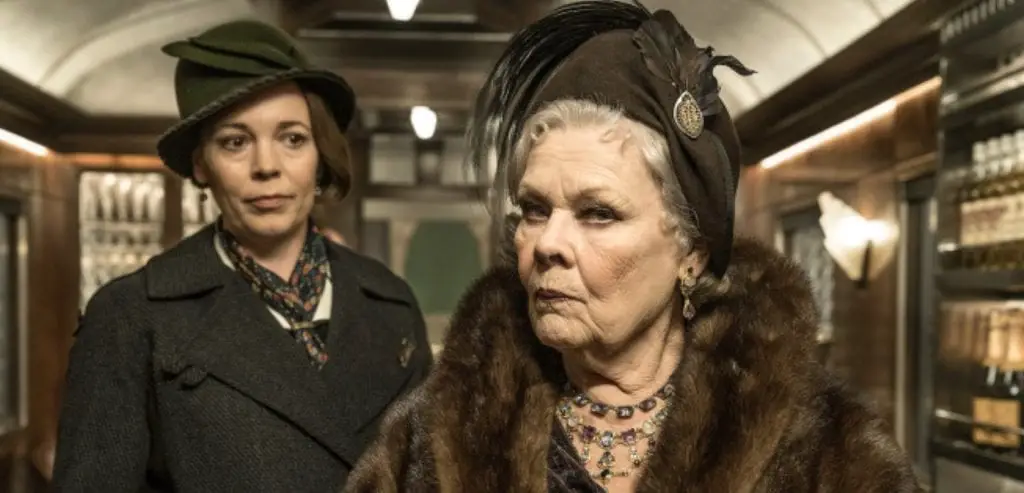
Oh, and a middle-aged female missionary was transformed into a young one. That, by the way, holds true even in the previous adaptation. A mystery why that keeps happening, isn’t it?
2. Orient Kyuukou Satsujin Jiken (Murder on the Orient Express, 2015)
This is a Japanese AU. Yes, there is a Japanese AU filmed of the Orient Express case. And let me tell you, it’s not half bad.
The main downside of this, for me, was the comedic tone of the show (it’s a two-episode miniseries), due chiefly to the interpretation of Poirot. It is true that Miss Debenham says explicitly in the book that Poirot was a “funny little man” that could never be taken seriously, but this comes chiefly from the self-importance with which he does things considered strange or ridiculous by other people. It’s not supposed to be the almost slapstick comedy aspect Poirot (called Mr. Suguro here—the transposition is complete) gains on this show. Especially at the very beginning of the show, I found it hard to get over.
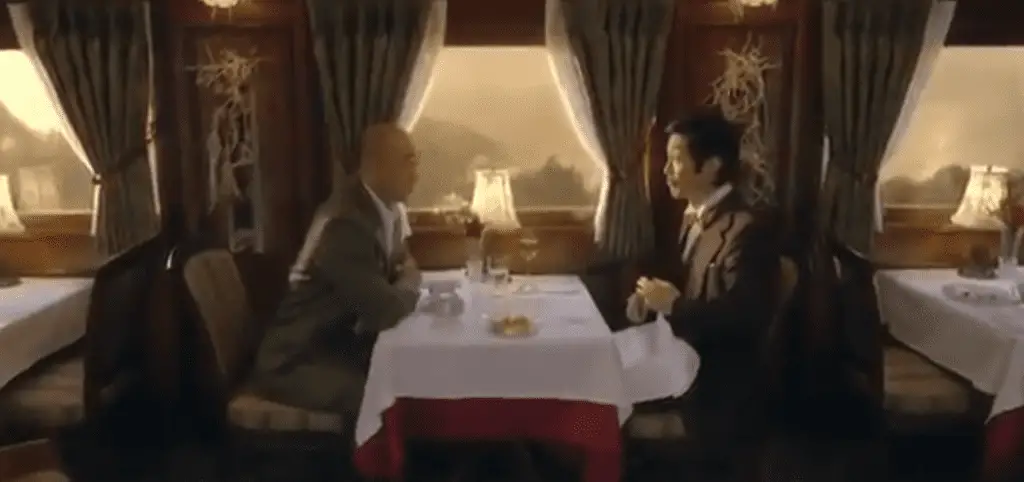
The transplantation to Japan, as far as I can tell, was done very well. Some characters changed in tone, and they are all Japanese now, but it generally stayed faithful to the tone of the book. Different 30s English prejudices were exchanged for modern Japanese ones. I don’t know enough about Japan to know how fittingly it was done, but it seemed to work well enough.
Colonel Arbuthnot underwent perhaps the most radical transformation. From a stiff and slightly ridiculous British colonel, he was turned into a man of real presence, and probably the strongest charisma on the set. In fact, he stole some of what is Princess Dragomiroff’s role in the book, and was in some ways closer to Count Andrenyi than his book counterpart. Nevertheless, I didn’t mind the transformation. An essentially English caricature would have no place in a Japanese AU, and while I don’t doubt Japan has its own kind of army types that can be caricatured, perhaps it would not fit the setting. The character they created did fit; the contrast between his utter seriousness and Poirot’s comic behavior worked quite well.
I said he stole some of the Princess’ clout, but she was not badly done herself. Her scenes don’t quite have the strength they do in the book, but they were adapted at least. I’m afraid it was the acting that was not quite up to par with this very difficult role. A similar fate befell Mrs. Hubbard, as her final transformation was not as complete and impressive as the one in the book. Again, it’s a hard part to act.
The Andrenyis and Masterman, too, were adapted very well, and Fraulein Schmidt was, I daresay, even improved in comparison with the book. In the book she is one of the most forgettable characters, whereas here she has true force of personality. My only problem was that I could not imagine her cooking, and that’s definitely a nitpick!
The adaptation, in spite of being an AU, is very faithful, though in some scenes it actually does harm. Most obviously it shows with Mary Debenham, who also represents a particular type of a young English woman. Here, she was infused with some uniquely Japenese additions to her character in a way that, at least for me, didn’t entirely work. Fraulein Schmidt felt more like her book self than Mary did at times. The scenes also suffer from not enough time to breathe. They attempt to include as much of the book dialogues as they can in the relatively limited space. Some of the characters, therefore, don’t get the space they need to really shine. Some of Poirot’s deductions towards the end, too, were a little too miraculous, because there was no time left to show his thought process.
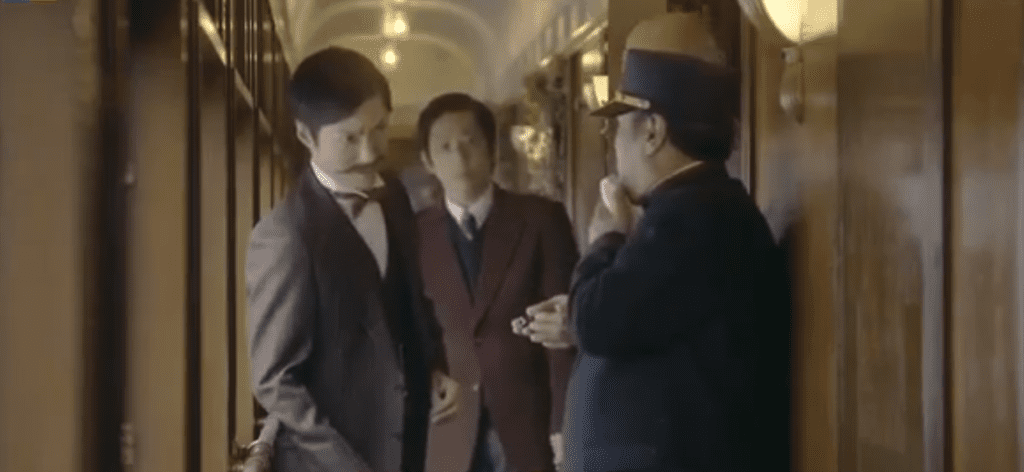
What I appreciated, on the other hand, was the neat and organized nature of the investigation, including a plan of the carriage shown in the lower right corner of the screen. It’s often hard to follow the different factual points of a complicated investigation on screen. This adaptation did its best to overcome it.
But the most important thing I saved for last. As I said, this is a two-part miniseries. The investigation, however, is all concluded in the first part. The second one is devoted to a flashback that shows the planning of the crime. While that is not technically an adaptation of the book anymore, it’s a brilliant idea, and one that moved this adaption further up the list, above the one from this year.
1. Murder on the Orient Express (1974)
This is frustrating. I really wanted to come up with something a little more original, but there is just no denying it. The 1974 version is the best of all the adaptations, and by quite a large margin.
In fact, I have only one major problem with it, and that’s Poirot. Granted, that is quite a significant problem given that he is the main character, but still in other aspects it overshadows all the other adaptation so much it stays perfectly secure in first place.
The problem with Poirot is that he’s not Poirot at all. Of all the adaptations, he’s perhaps closest to the Japanese one, though his personality is not skewed towards its comedic aspect. It is, however, similarly exaggerated, this time to weird voluptuous gestures that are absolutely not in accordance with the book detective’s perfect manners. One of the first scenes, for example, has Poirot complain of the food in a restaurant by tearing the menu and pouring out his coffee into an ice bucket. As before, I have to ask my confused “why?”. This was the first adaptation. There was no need to set it apart from the others. So why on Earth did anyone feel the need to turn Poirot into this?
Not to mention, when he gets angry, he looks and behaves like Hitler. I’m sorry for this comparison, I have no intention of invoking Godwin’s law, but it’s true. His way of speech is very reminiscent of Hitler’s public speeches. Taken together with his small mustache, it’s actually very disturbing.
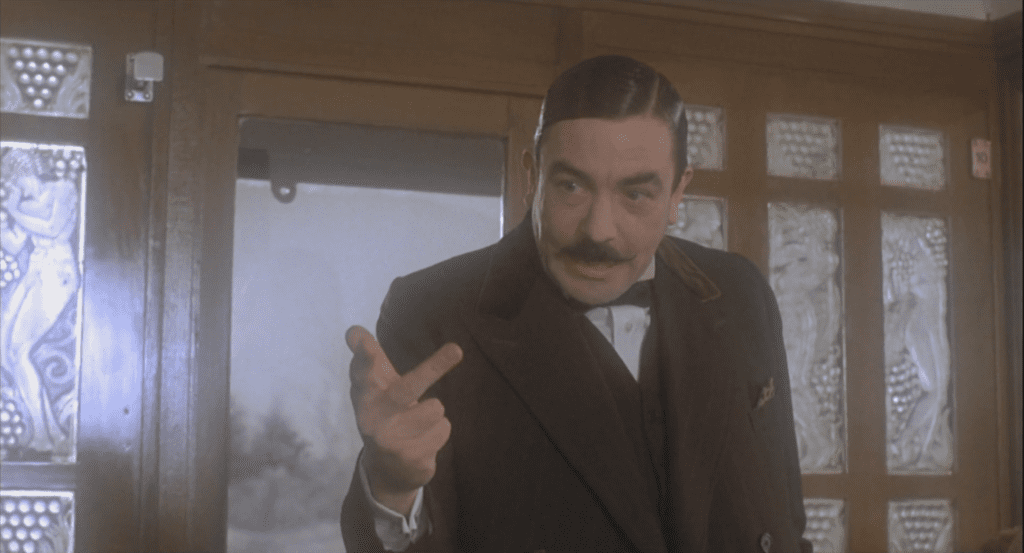
Nevertheless, this film is the only one that came close to Christie’s ability to quickly capture a character and to the soft irony she frequently displays. Ratchett’s personality, for example, is shown in small, not overdone scenes, though he’s also more sympathetic than in the book. Sometimes the characterization is a little forced. There are scenes where it’s just a little too obvious they exist only to set up a character and it’s hamfisted. But generally the flow is good. Additionally, here most of all the adaptation you get that wonderful effect of when you watch knowing the truth behind the events, you can see it in every movement of every actor.
As for the characters, even here Miss Debenham is made softer and Mrs Hubbard less comedic. Debenham, however, comes perhaps the closest she ever does to her book characterization. It’s a tie with the 2001 version. Mrs. Hubbard was significantly changed, but in such a way that it fit her character perfectly. Princess Dragomiroff was very nearly spot on. Michel, Count Andrenyi, Foscarelli, and Masterman were entirely so.
MacQueen is absolutely masterfully acted, but there was a strange interlude with his neurotic psychology that rang false for me. Ohlsson is over the top as she is in every adaptation. I don’t know what it is about religious missionaries that makes people unable to depict them reasonably.
Overall, though, it’s evident from the first scenes that this film is in an entirely different league from the others, with much better script and acting, as well as direction. Here, the characters actually mean something, and you manage to form a relationship to them in the course of the story, which is not the case with most of the others.
In fact, this is quite close to a perfect adaptation of Murder on the Orient Express. If only that terrible Poirot could be replaced by Kenneth Branagh’s…

